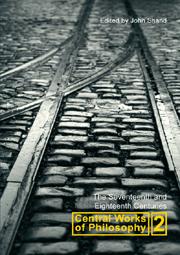Book contents
- Frontmatter
- Contents
- Contributors
- Preface
- Seventeenth- and Eighteenth-Century Philosophy: Introduction
- 1 René Descartes: Meditations on First Philosophy
- 2 Baruch Spinoza: Ethics
- 3 G. W. Leibniz: Monadology
- 4 Thomas Hobbes: Leviathan
- 5 John Locke: An Essay concerning Human Understanding
- 6 George Berkeley: A Treatise Concerning the Principles of Human Knowledge
- 7 David Hume: A Treatise of Human Nature
- 8 Jean-Jacques Rousseau: The Social Contract
- Index
7 - David Hume: A Treatise of Human Nature
- Frontmatter
- Contents
- Contributors
- Preface
- Seventeenth- and Eighteenth-Century Philosophy: Introduction
- 1 René Descartes: Meditations on First Philosophy
- 2 Baruch Spinoza: Ethics
- 3 G. W. Leibniz: Monadology
- 4 Thomas Hobbes: Leviathan
- 5 John Locke: An Essay concerning Human Understanding
- 6 George Berkeley: A Treatise Concerning the Principles of Human Knowledge
- 7 David Hume: A Treatise of Human Nature
- 8 Jean-Jacques Rousseau: The Social Contract
- Index
Summary
David Hume's A Treatise of Human Nature: Being an Attempt to introduce the experimental Method of Reasoning into Moral Subjects is an immensely complex, endlessly fascinating and hugely influential work. It is a bold attempt to give a secular account of the nature of human minds, based on the methods of science, an attempt that is tinged with sceptical lessons about the extent of human knowledge. Its full meaning remains controversial to this day and here I attempt to give a flavour of the work and its difficulties.
The work comprises three volumes (now referred to as “Books”): “Of the understanding”, “Of the passions” and “Of morals”. The first two books were published anonymously in January 1739, the third (by a different publisher but again anonymously) in November 1740. The Advertisement to the first two books tells us that the “subjects of the understanding and the passions make a compleat chain of reasoning by themselves”, whereas the Advertisement to Book III suggests some measure of independence of this book from the first two. The ambition of the work is shown by Hume's intention, expressed in the first Advertisement, to produce a further volume (or perhaps volumes) on politics and criticism. This intention was derailed, or at least redirected, by the failure, in Hume's view, of the Treatise. It “fell dead-born from the press”, he records in My Own Life (a brief autobiography penned in April 1776). Although the first two books of the Treatise were not entirely ignored, their early reception was not to Hume's liking.
- Type
- Chapter
- Information
- Central Works of Philosophy , pp. 167 - 192Publisher: Acumen PublishingPrint publication year: 2005



